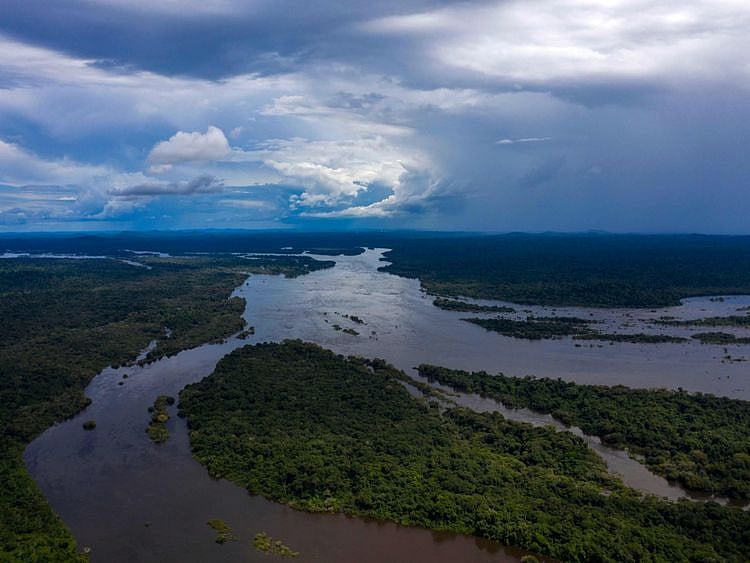President Jair Bolsonaro of Brazil poses a threat to the fragile equilibrium of the Amazon rain forest.
On May 6, the summary of a report by the United Nations, which will be published in full later this year, concluded that activities like farming, logging, poaching, fishing and mining are altering the natural world at a rate “unprecedented in human history”. And yet Brazil aims to open up the rain forest — which has already lost 20 per cent of its cover — to new development.
Bolsonaro has promised that indigenous communities would not get “one more centimetre” of protected land.
A free rein has been given to illegal loggers, clandestine gold miners and criminals who masquerade as meat and soybean producers, occupying protected lands. In a joint letter last week, eight former environment ministers warned, “We are facing a real risk of uncontrolled deforestation in the Amazon,” adding that Bolsonaro’s policies are “compromising the country’s image and international credibility”.
We have been here before. The dictatorship — which ruled the country from 1964-1985 — radically transformed the rain forest by building thousands of kilometres of roads, encouraging mass migration, and promoting environmental destruction for agricultural purposes.
Latest satellite data shows that deforestation has grown steadily since October 2017. In the first month after Bolsonaro’s election, deforestation increased more than 400 per cent, compared to the previous year.
But this is not just about the environment. With more than $100 billion (Dh367.8 billion) in agricultural exports in 2018, Brazil aspires to capitalise on the world’s growing demand for food. The new administration promises to withdraw from the Paris Agreement and develop the “unproductive Amazon”, including opening up large swaths of forests to agricultural land. President Emmanuel Macron of France has threatened to block a free-trade agreement between the European Union and Mercosur, the South American trade bloc.
This economic model has proved foolhardy in the past: It simply does not stimulate prosperity in the long term. Despite decades of resource extraction, 32 of the 50 municipalities with the lowest levels of development nationwide are in the Amazon. And of the more than 45,000 workers — who were employed under conditions of modern slavery — rescued by the authorities between 2003 and 2018, more than 10,000 were found in the Amazon state of Para.
A partial explanation is that during the region’s exploitation, there was no lasting, sustainable development plan, nor was the rule of law truly implemented. Frequently, pillaging of resources prevailed, Wild West-style, and it continues to do so today.
The Brazilian Amazon, which Global Witness declared the most dangerous place in the world for environmental activists, has had a worrisome increase in murders linked to the control of agricultural borders. During my two-and-a-half years of research in the Amazon, I have seen such violence in many regions. Hit men, sometimes hired by large landowners, kill those opposed to replacing the forest with single-crop farming.
Destroying the Amazon to stimulate the economy in the short term will only displace more small farmers, nut gatherers and fishermen toward the peripheries of cities such as Manaus or BelEm, where the favelas grow day by day. In these impoverished areas, vulnerable populations run the risk of falling into the hands of criminal organisations that have turned the Amazon into a dangerous corridor.
It’s not a coincidence that the homicide rate in Brazil has bifurcated over the last decade. While in the states of Rio de Janeiro and Sao Paulo, it fell by 18.1 and 41.9 per cent, in the Amazonian states it grew by 89 per cent, according to a large-scale study.
Brazil must heed civil society, indigenous groups and scientists who propose projects that generate wealth without destroying the forest or causing disorderly exoduses to the city. Given the biodiversity of the world’s largest tropical forest, the possibilities are endless.
The good news is that Brazil does not need to continue expanding its agricultural frontiers — productivity can be sufficiently improved through investment and technology. For instance, acai berries, which come from the acai palm and are considered a super fruit, have conquered world markets. Traditionally and ecologically harvested, their collection employs tens of thousands of people and generates hundreds of millions of dollars.
The international community must also play a key, active role. The Amazon is the Earth’s patrimony and its destruction will impact us all. Within the framework of climate agreements, Brazil should receive generous funds from developed nations in exchange for preserving the Amazon; it already receives large donations from Norway and, to a lesser extent, Germany. For the rain forest to survive, the country needs an economy that revolves around its conservation instead of its destruction.
— New York Times News Service
Heriberto Araujo is a journalist and writer. He is currently working on a book about violence in the Amazon.
Sign up for the Daily Briefing
Get the latest news and updates straight to your inbox
Network Links
GN StoreDownload our app
© Al Nisr Publishing LLC 2026. All rights reserved.
